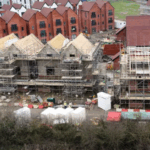Defence Secretary John Healey has declared there is “no doubt” that UK defence spending will reach 3% of GDP by 2034, reaffirming the government’s commitment to a significant increase in military funding amid growing global threats.
The statement comes ahead of the government’s Strategic Defence Review, due to be published on Monday, which will outline long-term plans for military investment and national security. The review is based on the assumption that the UK will steadily increase its defence spending to meet the 3% target within the next decade, starting with a rise to 2.5% by April 2027.
Speaking to The Times, Healey said the spending trajectory allows the government to “plan for the long term” and meet increasing pressures. A government source also told the BBC that Healey had “full confidence” the 3% target would be reached during the next parliament.
The upcoming defence review, a 130-page document containing around 45,000 words, will reflect an increasingly complex global security environment. It is expected to warn of “a new era of threat” marked by the rise of drone warfare and artificial intelligence, and will propose deploying digital warfare specialists alongside troops to both defend against and operate unmanned systems.
The review will also address growing concerns over geopolitical instability, highlighting Russia as an “immediate and pressing” threat, and describing China as a “sophisticated and persistent challenge.” Iran and North Korea are expected to be labelled as “regional disruptors.”
However, some of the review’s proposed projects may only be viable if the 3% spending target is achieved, raising questions about future funding flexibility. The Office for Budget Responsibility (OBR) has estimated that meeting the 3% goal would require an additional £17.3 billion by the 2029-30 fiscal year.
In a separate development, the Ministry of Defence announced an extra £1.5 billion will be allocated to improving military housing. The funding will be used for urgent repairs such as fixing faulty boilers, addressing mould, and developing new homes. The move follows a parliamentary report last year revealing that two-thirds of service family homes required significant refurbishment.
The Liberal Democrats welcomed the investment in military accommodation but urged the government to go further by ensuring all military housing meets the Decent Homes Standard, which governs the condition of social housing.
Meanwhile, other departments continue to negotiate their budgets. Deputy Prime Minister Angela Rayner has yet to reach agreement with the Treasury over funding for housing and local councils, and the Home Office remains in the early stages of its negotiations.

















